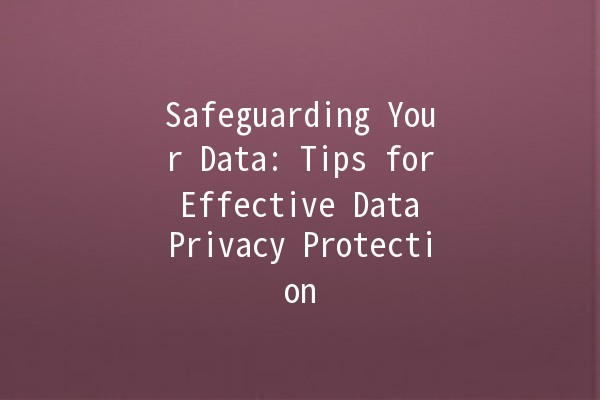




In our increasingly digital world, data privacy is a pressing concern for individuals and businesses alike. With the surge in data breaches, identity theft, and unauthorized data usage, it is imperative that everyone takes proactive measures to protect their personal information. This article provides practical tips and techniques to enhance your data privacy, ensuring that your sensitive information remains secure. Let's delve into some useful strategies for safeguarding your data.
Before diving into the techniques for data privacy protection, it's essential to understand what data privacy entails. Data privacy refers to the proper handling, processing, and storage of personal information. This includes safeguarding data from unauthorized access and ensuring that individuals have control over how their information is collected and used.
As technology evolves, so does the sophistication of privacy threats, making it critical to stay informed about potential risks and preventive measures. Below are some vital practices to boost your data privacy and protect your personal information.

Passwords are the first line of defense against unauthorized access to your accounts. Using strong, unique passwords for each of your accounts significantly enhances your security posture.
Create Complex Passwords: Use a combination of uppercase letters, lowercase letters, numbers, and special symbols. For instance, instead of a simple password like “Password123”, consider using “P@55w0rd!2023”.
Use a Password Manager: Instead of trying to remember complex passwords for every site, utilize a password manager to securely store and generate strong passwords. This way, you only need to remember one master password.
Enable TwoFactor Authentication (2FA): Whenever possible, enable 2FA for an added layer of security. This requires you to provide a second form of verification, such as a text message or an authentication app, when logging in.
Regular software updates can help protect your devices from vulnerabilities that hackers may exploit. Updates often contain patch fixes for known security issues.
Automatic Updates: Enable automatic updates for your operating system and applications to ensure you receive the latest security patches without delay.
Manual Checks: Periodically check for updates on devices that do not support automatic updates, such as older smartphones or specialized software.
Firmware Updates for Routers and IoT Devices: Don’t forget about your home network devices; keeping your router and smart devices updated is crucial for preventing unauthorized access.
While convenient, public WiFi networks can expose you to various security risks. Cybercriminals can intercept data transmitted over these networks, making it easy to steal sensitive information.
Avoid Sensitive Transactions: Refrain from accessing your bank accounts or entering personal information when connected to public WiFi.
Use a Virtual Private Network (VPN): A VPN encrypts your online activities, making it significantly harder for hackers to intercept your data. Always use a trusted VPN service when accessing unsecure networks.
Disable Automatic Connections: Configure your devices to prevent automatic connections to available WiFi networks, which can help you avoid unintentional exposure.
Social media and online activities can compromise your data privacy. It’s crucial to limit the amount of personal information you share publicly.
Review Privacy Settings: Regularly review and adjust privacy settings on social media platforms to restrict who can see your posts and personal information.
Limit Information Sharing: Be mindful of the information you share online. Avoid posting sensitive data such as addresses, phone numbers, or sensitive images that could be misused.
Conduct Regular Audits: Periodically audit your social media accounts and online profiles. Remove outdated or unnecessary information and consider deleting accounts you no longer use.
Data encryption is a robust method for protecting sensitive information, making it unreadable to unauthorized users. Whether you are storing files on your device or sending emails, encryption should be a crucial part of your data privacy strategy.
File Encryption Software: Use encryption software to protect sensitive files on your computer. Programs like VeraCrypt or BitLocker can safeguard your information from unauthorized access.
Encrypted Messaging Apps: Replace standard messaging apps with encrypted options like Signal or WhatsApp for more secure communication. These apps encrypt messages, ensuring privacy during transmission.
Secure Email Services: Consider using email services that offer endtoend encryption for enhanced privacy when sending sensitive information.
Staying informed about data privacy issues and educating others is vital for creating a secure environment. Dedicating time to learn about the latest threats and preventative measures will bolster your efforts in protecting sensitive information.
Data privacy is essential because it protects individuals' personal information from misuse and exploitation. As cyber threats grow, maintaining data privacy can prevent identity theft and unauthorized access to sensitive records.
Signs that your data may have been compromised include receiving unexpected account activity alerts, unauthorized logins, or your accounts being locked out. Regular credit report checks can also reveal discrepancies.
If your identity is stolen, immediately report it to your financial institutions, monitor your accounts for unfamiliar activity, and consider placing a fraud alert on your credit report. Additionally, file a report with the Federal Trade Commission (FTC).
It is advisable to update your passwords every 36 months, especially for sensitive accounts. However, if a service you use reports a data breach, change your password immediately.
While social media can be convenient, it is important to be cautious about the information shared. Always review privacy settings and limit personal data visibility to only trusted contacts.
Educate children about the importance of online privacy, encourage them to avoid sharing personal information, and monitor their online activities to ensure they adhere to safe internet practices.
Incorporating these tips into your daily routine will significantly enhance your data privacy protection efforts. By being proactive and informed, you can mitigate risks and safeguard your personal information in an everevolving digital landscape. Stay vigilant, and remember that data privacy is everyone's responsibility.